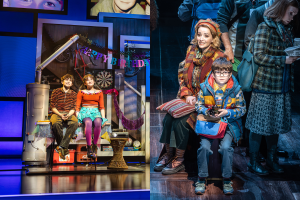Press Get a Sneak Peek at T.R.B.P’s Blue/Orange
In a bold move, and to show his enthusiasm for Theatre Royal Brighton Productions latest piece, the Artistic Director Christopher Luscombe opened up his rehearsal room to selected members of the press and allowed us to take a peek at preparations for their second production.
Following on from their critically acclaimed production of Arthur Wing Pinero’s Dandy Dick, Joe Penhall’s Blue/Orange, which won several best play awards when it was first produced at the National Theatre in 2000, is now being prepared for a full national tour, followed by a return to the West End, and stars Robert Bathurst, Gerard McCarthy and Oliver Wilson.
The cast performed the intense and dramatic opening scenes from the play before breaking for lunch and, at that point, I took the opportunity to talk to the team and started by asking Christopher;
Twelve years after it was written, is the play still as topical and relevant?
Oh yes, absolutely. In the recent history of mental health problems I don’t think that anything has dramatically changed. I think there is more awareness of issues like Schizophrenia now than there was, but only to a degree. The drugs that they can use these days are slightly different but all the questions still remain. There is great mystery about the diagnosis of the condition and how bad the symptoms have to be before you can put that label on it.
We know that there is a quite marked occurrence of Schizophrenia in the Black Community, particularly in the big cities and urban areas, and they are trying to work out how much may be genetic, or to do with racism, or from childhood issues and people still do not know the answers so it’s still very much a live issue.
Racism and mental health are not what one would usually see a source for comedy.
Well, I wouldn’t call the piece a comedy, but it is a play with a lot of humour in it. Really it’s a play about the way that these two doctors spar, and the way that they deal with this patient in different ways. One of them is convinced that the patient is Schizophrenic and must be treated in the hospital but the older doctor is very much towing the Government line of getting the patient back into the community, treating him in the community and not having him locked up. The way that they manipulate each other is a great demonstration of the way the human beings are prepared to go to any lengths to get what they want.
We just saw the opening scene from the play and you really have found three brilliant actors.
I see the play, in a way, as a vehicle for three great performances and it does need three people who can really act. The way it’s written has a tremendous sense of rhythm to it and he’s tried to replicate the way we speak – in jagged, awkward sentences – and yes, it’s a very intense piece in the same way that Arthur Miller or Tennessee Williams are intense. It’s about profound issues and things that people take very seriously.
The play talks about someone who, if the diagnosis is wrong, may go out and kill himself, or he might go out and kill someone else. So, for these medical professionals, it’s a very difficult decision to make and that’s what we are trying to convey. It really is life and death.
Playing the part of the patient, Christopher, is Oliver Wilson and, as we met, I started by complimenting him on the intensity of his performance;
That’s so cool, thanks. I’m really getting into the character now and a lot of the more nervous behaviour, the sudden changes in pace or direction are improvised because it helps to keep the character fresh. I try and play the character as Christopher, the person, and not just play someone who visibly has mental health issues. I just, moment by moment, try to imagine what he is thinking and that prompts the quick changes, the extremes of his personality.
Have you studied to play the part of a guy with mental health issues?
I suppose I have looked at some of the behaviour, but the issue with Christopher is that he is a by-product of his environment. He may have previously had some traces of mental issues in his family but, because of his poverty, his upbringing, lack of support and dealing with the racism in his area, the paranoia is amplifying the bad situation that he is in.
It’s a very specific case to Christopher so all I can do is take the text, take what the character is saying, and try and make sense of it myself really. I know that before, when I have approached a Shakespeare character that has extreme thoughts or behaviour, I just have to make it my part. I have done some research for Blue/Orange and we had a psychologist who came to tell us about some of the possible traits he could have as well. He might have childlike behaviour, aggression, mood swings and so I just follow the text and make it my own.
Does it get very emotional?
Yes it gets very emotional. We are still really finding new things and developing them. We’re just letting scenes run and there are still places to go. There is nowhere in the script that it says that Christopher breaks down and cries, but there are places where it’s implied and I’m sure the emotion will carry me through that. The thing with him is that he’s constantly changing so that, even if he breaks down, something else will happen and that might make him angry or happy.
Do you get affected by an audience’s reaction?
I believe that theatre is all about communication and the whole purpose is that you have an impact on your fellow actors, and on the audience, when you are telling a story – so you feel that energy. Just as much as the audience will laugh, which is a great buzz, when you get that pure, dead, silence – when there is not one movement in the whole theatre whether it’s 100 or 1000 people watching you – that buzz is what continually reminds you that, when you do it right, this is the best job in the world.
Gerard McCarthy plays the part of Bruce, the younger doctor and I asked him how he got involved with the production;
I worked with Chris Luscombe about two or three years ago and he sent me the script and asked me to read it and tell him what I thought. I read the whole thing in about 90 minutes and I thought it was just incredible. So I called and said that I thought it was brilliant and I asked him if he was directing it and, quick as a flash, he said, “Yes, Do you want to play Bruce?”, and I was like – ahhhhh YEAH !
I know there are a lot of books that are real page turners, but they are novels. I finished this script and I knew that is would be something really special, before you’ve added actors, before you’ve added a Director, before you’ve added everything that comes with it, and you’ve just got the script – I knew it would be brilliant.
Did you know who you would be starring with?
When I got back to Chris I told him that it was a brilliant script and that I was thrilled he was directing it and I asked who was in it. He told me that Robert Bathurst would be playing Robert and I thought, great! Then I asked who was playing Christopher and he said that he couldn’t tell me because he had only just offered the part to someone and he didn’t want to tell me in case it didn’t happen, but he did tell me that the guy he offered it to is phenomenal. There are times now, in rehearsals, when I just stop and watch Oliver and, every time I do, I find myself thinking, “Oh my God, you are just brilliant!”
He’s great for the play because, the audience comes in and I give an argument – he’s sick, this is a hospital, he should stay here until he’s better – and the audience can see that makes sense and they agree with it. Then Robert comes in and his argument is – he’s not dangerous to himself, he’s not dangerous to anyone else, he’s not wired up to a machine, why does he need to be in this building at the taxpayer’s expense? – and the audience agree with that too.
But, all the time, you get to watch the person that they are arguing about. So there is a lot of listening to myself and Robert, but watching Oliver and then trying to decide whether his character, Chris, should stay in the hospital. It’s a real live tug-of-war and I think that is the single best thing about the play.
And all the time you are aware, he is actually a real person.
Yes, he’s not a statistic. And yes, I suppose I haven’t thought about it like that, but it would be a very different play if it was just the two doctors having this conversation and he wasn’t there. The audience get to meet this young, bright, funny, charismatic guy and you don’t think, as some people might when mental health is the issue, of straightjackets and suchlike, you just think, “Is he safe out on the streets?”
We give the audience both sides of the argument and, I suppose the only thing that you can compare it to is being a jury member. You sit there, you are presented with all the evidence so that you can try and decide what is best for Christopher – and then the play is over. You go home and you’re still trying to decide if they made the right decision – should he stay in hospital or should he go home.
Heading the cast is Robert Bathurst who has the role of the Consultant, Robert, and I started by asking him if his character is the calming influence that he first appears to be;
Oh no, he stirs it all up. There is an awful lot of conflict in the piece and, with Robert, his mode of address – although it appears mollifying and friendly – when he has his back on the ropes he fights very hard and then, when he’s really desperate, he just pulls rank. There are times when he just says,” I am senior, and therefore I am right”
It’s a real scrap and he is both harsh and cruel but he does it because, at the back of it all, is the fact that he wants to get on. There is still another level of professional advancement for him and if things go wrong, and he doesn’t get his research out on time, that will be that – and he’s not going to let some little whipper-snapper doctor get in his way.
Oddly enough he is the most unsympathetic character in the piece and yet he is the one who espouses the cause of liberty, he’s the one wants the patient out there; he wants his in the community and not banged up.
He sounds to me like a fairly typical consultant.
Well, yes, precisely. I think that, although he’s sort of at the top of the tree, he’s not quite there and I think there is a certain amount of fear underpinning everything that he does and he comes out with it during the show. He unburdens himself to the patient, Christopher, in a way that he would never unburden to the other doctor. You learn more about him, and about what’s going on in his life, by what he says to the patient.
It seems to be quite a complex piece.
You know, the audience always likes to know who’s the “goodie” and who’s the “baddie”, who’s this and who’s that, and this piece will constantly unsettle them because Joe’s writing is full of human complication in a way that is quite rare in stage writing. In most pieces, people generally fly a flag of a certain character type whereas this is much muddier. The way they react to events is complicated – and human.
The audience themselves may have come in with pre-conceptions about mental health issues and ethnicity, and talking about them is something that we usually bend over backwards to avoid, but we confront them full on and the audience are invited to take part in a debate that, in some ways, they would much rather not be a part of.
A lot of the time they will be thinking, “Did he REALLY just say that?” and, in that way, the play is very clever. It plays with our preconceptions very cannily. It’s like any debate, after a while you start to see both sides and whatever you may think of the character, you can start to appreciate their argument.
The other thing about this piece is that, despite everything that’s happening, it is very funny. There are some cracking lines in it. At one stage Christopher says, “White City, South Africa Road, even the names are a f**king wind up!” It’s a play that both tickles and shocks.
Blue/Orange runs from 13-22 Sept at the Theatre Royal Brighton and then tours to the following venues; The Waterside, Aylesbury 25-29 Sep, The Princess Theatre, Torquay 2-6 Oct, The Grand Opera House, York 9-13 Oct, The New Victoria, Woking 16-20 Oct, The Alexandra, Birmingham 23-27 Oct, The Churchill, Bromley 30 Oct – 3 Nov, The Theatre Royal, Glasgow 6-10 November, The Richmond Theatre 13-17 Nov and The Regent Theatre. Stoke on Trent 27 Nov – 1 Dec prior to a West End transfer at a venue yet to be announced.












